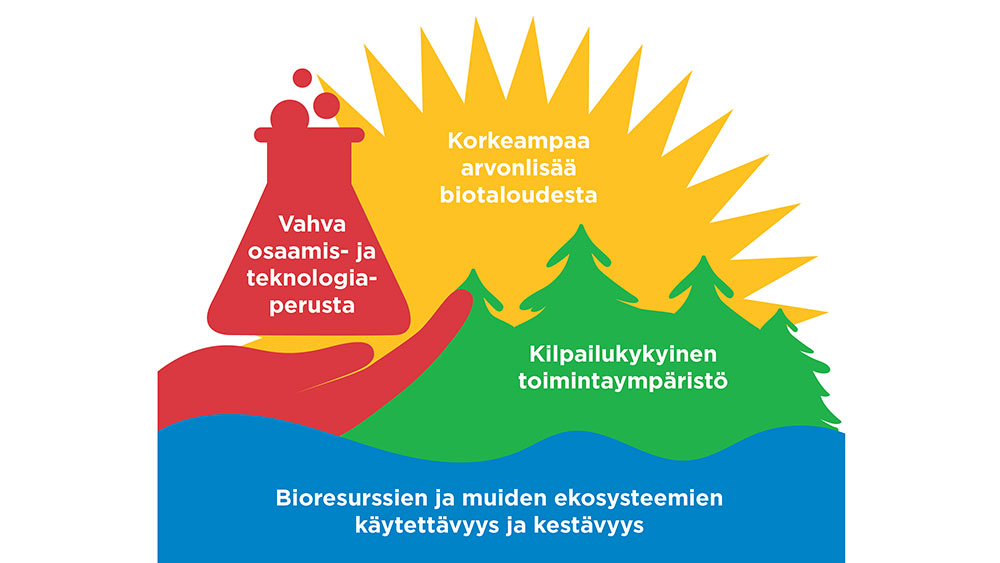Bioeconomy Strategy 2022–2035 – Sustainably towards higher value added

Finland’s new Bioeconomy Strategy has been completed. The strategy aims to double the value added of bioeconomy in an ecologically, socially and economically sustainable manner and to make Finland climate neutral by 2035.
Bioeconomy is an exceptionally important sector for Finland. In 2019, it generated a value added of EUR 26 billion, which corresponds to 13% of the value added generated in the national economy.
Bioeconomy is implemented in a resource-wise manner through the circular economy. The strategy strongly supports the green transition of Finland and the EU. In order to promote the wellbeing of society, attention is paid to the fair distribution of benefits and disadvantages of the bioeconomy.
“Bioeconomy is an exceptionally important part of Finland's national economy. The strategy’s new direction focuses on increasing the value added. In particular, we have wanted to highlight the use of new bio-based products in the textile industry, pharmaceutical industry and even as battery materials. All this is based on sustainable use of renewable raw materials,” says Minister of Economic Affairs Mika Lintilä.
Bioeconomy is based on production that makes use of renewable natural materials in a sustainable manner and develops and deploys related innovations and technologies. In Finland, services that utilise nature, such as nature tourism, are also part of the bioeconomy.
The Ministry of Economic Affairs and Employment launched a project to update the Bioeconomy Strategy in summer 2020. It recognised increasing the value added of bioeconomy as an important priority area that other strategies do not comprehensively address. Its measures implement the objectives of several other strategies, such as the forest strategy, the industrial strategy and the Clean Planet for all.
The strategy’s measures are divided under four headings: 1) Higher value added from bioeconomy, 2) A strong knowledge and technology base, 3) A competitive operating environment and 4) Usability and sustainability of bioresources and other ecosystem services. The strategy also includes sector-specific measures.
Value added is sought by developing new raw materials, manufacturing methods, products and services, by increasing the value added and resource efficiency, and by utilising side streams and circular economy operating models. There are promising developments in sectors such as forestry, food and energy production, pharmaceutical, chemical and textile industries, water supply, fisheries, aquaculture, tourism services and the natural products sector.
The objectives of the Bioeconomy Strategy by 2035 are:
- double the value added of bioeconomy
- create competitive and innovative bioeconomy solutions to global problems
- generate business that promotes renewal both to the domestic and international markets, which will bring wellbeing to Finland as a whole
- increase the resource-wise use and recycling of materials and utilise side streams
- reduce dependency on fossil fuels and other non-renewable raw materials
- ensure ecological sustainability, social justice and the renewal capacity of renewable natural resources and to strengthen broad-based competence in the bioeconomy
- improve and reform the technology base
The measures to increase the value added of bioeconomy include implementing an RDI programme for the green transition of bioeconomy, and promoting the establishment of innovative pilot and demonstration facilities and the first industrial-scale plants in Finland.
The strategy’s measures will be funded by the Sustainable Growth Programme for Finland. Several ministries are responsible for implementing the strategy in cooperation with many operators. The regions play a key role in achieving the objectives of the strategy and they are encouraged to draw up their own bioeconomy action plans. The Ministry of Economic Affairs and Employment will appoint a steering group for the implementation of the strategy.
Inquiries:
Petri Peltonen, Under-Secretary of State, Ministry of Economic Affairs and Employment, tel. +358 29 506 3662
Ulla Palander, Senior Specialist, Ministry of Economic Affairs and Employment, tel. +358 29 504 9235
Anne Vehviläinen, Ministerial Adviser, Ministry of Agriculture and Forestry, tel. +358 29 516 2236
Sarianne Tikkanen, Senior Specialist, Ministry of the Environment, tel. +358 29 525 0042
